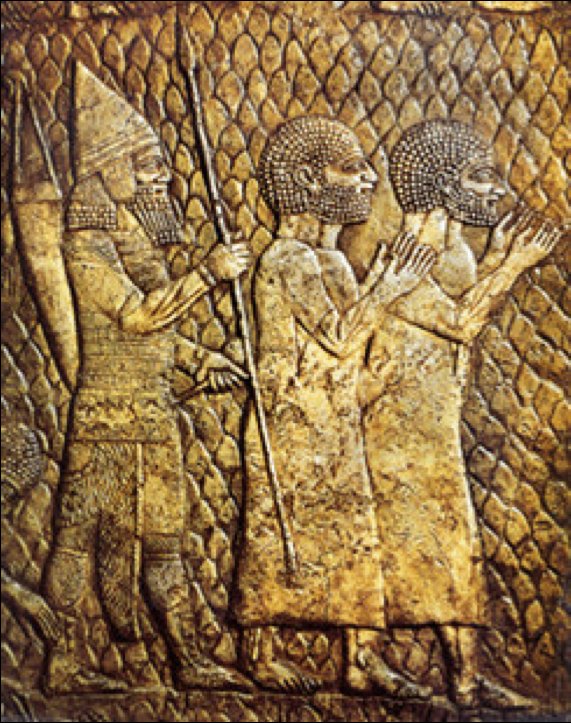The Jews have been a diaspora people not since the destruction of the temple in 70 AD, but since the Babylonian exile in 586 BC.
Most Jews lived outside Palestine during the life of Christ.
I think there are several important insights from remembering this historical context:
Most Jews lived outside Palestine during the life of Christ.
I think there are several important insights from remembering this historical context:

The Jewish diaspora began in 586 BC when the Babylonians conquered Judea and took most of the population back to Mesopotamia.
Small groups started returning to Jerusalem in 538 BC (Ezra, Nehemiah), but 586 BC was really the last time that a majority of Jews lived in Palestine.
Small groups started returning to Jerusalem in 538 BC (Ezra, Nehemiah), but 586 BC was really the last time that a majority of Jews lived in Palestine.
The Assyrians had conquered the northern kingdom about 150 years previously, but were much more successful in destroying any group cohesion these other Israelite tribes had. 

When Mary and Joseph fled to Egypt, they certainly settled in an existing Jewish community with family members, probably in Alexandria.
A Jewish platonic philosopher named Philo estimated that 1 million Jews lived in Egypt during his time (20 BC to 50 AD).
A Jewish platonic philosopher named Philo estimated that 1 million Jews lived in Egypt during his time (20 BC to 50 AD).

This was probably an exaggeration, but it was at least in the hundreds of thousands, and some other modern sources estimate that Alexandria was 35% Jewish during the Roman era. Many were more fluent in Greek than Hebrew, and heavily influenced by Greek philosophy.
Elephantine in modern day Aswan was another center of the Jewish diaspora. It was located on an island in the Nile right below the first cataract. Judean mercenaries settled there to guard the frontiers of Egypt sometime in the 600s BC, even before the Babylonian exile.
The Babylonian Jews were the ones who compiled the Talmud from 200 to 500 AD. They remained a huge force in the politics of the Parthian and Sassanid Empires, and Islamic Caliphates in the Middle East, lasting all the way until modern times when they were expelled following 1948.
The book of Job is an especially Persian text, having very little in common with the way of writing or the themes common in the Mediterranean, but it is very much at home with other eastern poetry of the time.
So let's just look at the status of worldwide Judaism during the time of Christ:
Jerusalem remains the heart and soul of the Jews, it's spiritual and literal motherland.
Galilee and fertile Jezreel Valley are another epicenter of Jewish settlement in Palestine.
Jerusalem remains the heart and soul of the Jews, it's spiritual and literal motherland.
Galilee and fertile Jezreel Valley are another epicenter of Jewish settlement in Palestine.
Huge populations of very worldly, Greek-speaking Jews live in Egypt, Crete, Cyprus, Asia Minor, and Rome.
One of the questions I'd like to understand better is why Paul decided to focus so heavily on working within these networks rather than in Mesopotamia.
One of the questions I'd like to understand better is why Paul decided to focus so heavily on working within these networks rather than in Mesopotamia.
Jesus would have been very aware of the Mesopotamian Jews. In fact, he probably had more in common with them given the language similarities than with the Greek Jews of the Mediterranean.
I just read tonight, and I'm not an expert in it, but apparently the Parthian Jews played a large role in the many Roman-Parthian wars that happened from 50BC to 200 AD.
It's interesting that the Jewish populations are split between these two empires.
It's interesting that the Jewish populations are split between these two empires.
Perhaps there were greater geopolitical considerations during the Great Jewish War and Bar Kokba revolts on the minds of the Roman emperors and generals as they crushed the Jews in Palestine. 

They couldn't tolerate any 5th column suspicions in the populations under their control with Palestine being located on the border.
Apparently Babylonian Jewish soldiers played a large role in the Parthian armies because of their fury at the destruction of the temple.
Apparently Babylonian Jewish soldiers played a large role in the Parthian armies because of their fury at the destruction of the temple.
Something else I'd like to learn more about is the evangelizing of the Jews, who found converts all over the east, from Yemen to Ethiopia, to India.
This will to preach is not an Apollonian or classical impulse. It comes from the east.
This will to preach is not an Apollonian or classical impulse. It comes from the east.
• • •
Missing some Tweet in this thread? You can try to
force a refresh

 Read on Twitter
Read on Twitter














